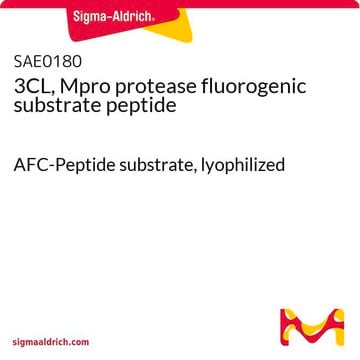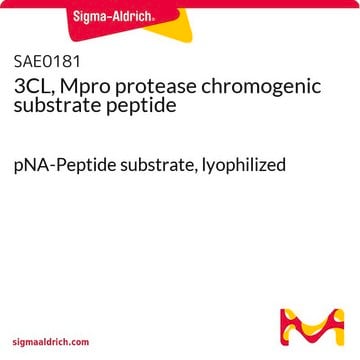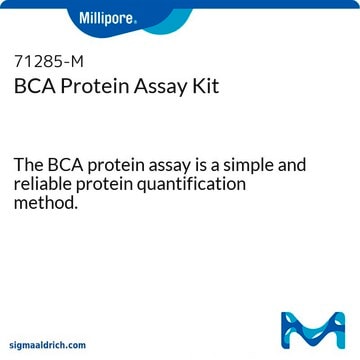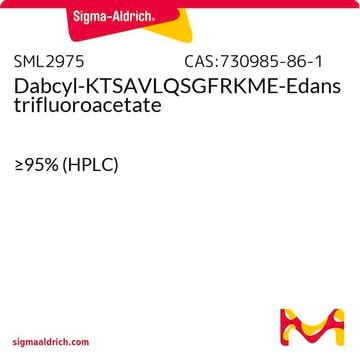SML2973
MCA-AVLQSGFR-Lys(Dnp)-Lys-NH2 trifluoroacetate
≥95% (HPLC)
Sinónimos:
N-[2-(7-methoxy-2-oxo-2H-1-benzopyran-4-yl)acetyl]-L-alanyl-L-valyl-L-leucyl-L-glutaminyl-L-serylglycyl-L-phenylalanyl-L-arginyl-N6-(2,4-dinitrophenyl)-L-lysyl-L-Lysinamide trifluoroacetate
Iniciar sesiónpara Ver la Fijación de precios por contrato y de la organización
About This Item
Fórmula empírica (notación de Hill):
C69H99N19O20 · xC2HF3O2
Número de CAS:
Peso molecular:
1514.64 (free base basis)
UNSPSC Code:
12352200
NACRES:
NA.77
Productos recomendados
Biochem/physiol Actions
MCA-AVLQSGFR-Lys(Dnp)-Lys-NH2 is a fluorescence resonance energy transfer (FRET) substrate derived from the N-terminal auto-cleavage fragment of the SARS-CoV Mpro viral protease ((excitation wavelengths 320 nm and emission wavelengths 405 nm). MCA-AVLQSGFR-Lys(Dnp)-Lys-NH2 is suitable to measure protease activity of COVID-19 virus Mpro, SARS-CoV Mpro, and other viruses.
Storage Class
11 - Combustible Solids
wgk_germany
WGK 3
flash_point_f
Not applicable
flash_point_c
Not applicable
Elija entre una de las versiones más recientes:
Certificados de análisis (COA)
Lot/Batch Number
¿No ve la versión correcta?
Si necesita una versión concreta, puede buscar un certificado específico por el número de lote.
¿Ya tiene este producto?
Encuentre la documentación para los productos que ha comprado recientemente en la Biblioteca de documentos.
Xiaoyu Xue et al.
Journal of molecular biology, 366(3), 965-975 (2006-12-27)
The viral proteases have proven to be the most selective and useful for removing the fusion tags in fusion protein expression systems. As a key enzyme in the viral life-cycle, the main protease (M(pro)) is most attractive for drug design
Fenghua Wang et al.
Scientific reports, 6, 22677-22677 (2016-03-08)
First identified in The Netherlands in 2004, human coronavirus NL63 (HCoV-NL63) was found to cause worldwide infections. Patients infected by HCoV-NL63 are typically young children with upper and lower respiratory tract infection, presenting with symptoms including croup, bronchiolitis, and pneumonia.
Zhenming Jin et al.
Nature, 582(7811), 289-293 (2020-04-10)
A new coronavirus, known as severe acute respiratory syndrome coronavirus 2 (SARS-CoV-2), is the aetiological agent responsible for the 2019-2020 viral pneumonia outbreak of coronavirus disease 2019 (COVID-19)1-4. Currently, there are no targeted therapeutic agents for the treatment of this disease, and
Nuestro equipo de científicos tiene experiencia en todas las áreas de investigación: Ciencias de la vida, Ciencia de los materiales, Síntesis química, Cromatografía, Analítica y muchas otras.
Póngase en contacto con el Servicio técnico








